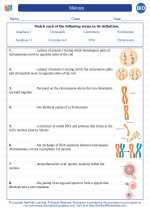Meiosis -> atmospheric pressure
Atmospheric Pressure
Atmospheric pressure is the force exerted on a surface by the weight of the air above that surface in the Earth's atmosphere. It is caused by the gravitational attraction of the planet and the motion of the air molecules within the atmosphere.
Factors Affecting Atmospheric Pressure
- Altitude: Atmospheric pressure decreases with increasing altitude. This is because there is less air above a given point at higher altitudes, resulting in lower pressure.
- Temperature: Higher temperatures lead to lower air density, resulting in lower pressure. Lower temperatures lead to higher air density and higher pressure.
- Humidity: Moist air is less dense than dry air, so humidity can affect atmospheric pressure.
Units of Measurement
Atmospheric pressure is commonly measured in units such as millimeters of mercury (mmHg), inches of mercury (inHg), atmospheres (atm), pascals (Pa), or pounds per square inch (psi).
Effects of Atmospheric Pressure
Atmospheric pressure has several effects on living organisms and the environment. Changes in pressure can affect weather patterns, influence the boiling and freezing points of water, and impact human and animal physiology.
Study Tips
- Understand the concept of atmospheric pressure and its relationship with altitude, temperature, and humidity.
- Memorize the units of measurement for atmospheric pressure and understand how to convert between them.
- Learn about the practical applications of atmospheric pressure, such as in weather systems and barometric pressure measurements.
- Practice solving problems related to atmospheric pressure using relevant formulas and calculations.
By mastering the concept of atmospheric pressure and its effects, you will gain a deeper understanding of the Earth's atmosphere and its impact on various aspects of life.
.◂Biology Worksheets and Study Guides High School. Meiosis

 Worksheet/Answer key
Worksheet/Answer key
 Worksheet/Answer key
Worksheet/Answer key
 Vocabulary/Answer key
Vocabulary/Answer key
 Vocabulary/Answer key
Vocabulary/Answer key
 Vocabulary/Answer key
Vocabulary/Answer key
